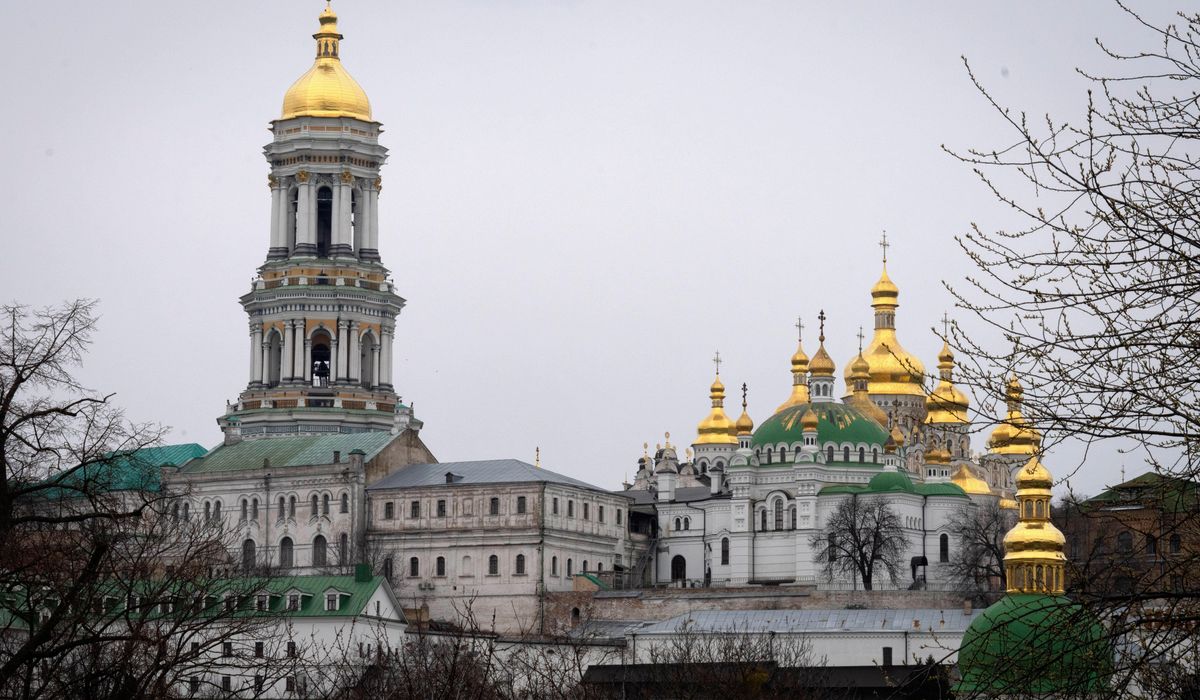


The Ukrainian government has declared that a branch of the Orthodox Church has failed to sever its longstanding ties with Moscow - and could soon be banned.
The looming ban affects one of the two rival branches of Orthodoxy in the country and further underscores the turbulent role of religion as Ukraine fends off the Russian invasion. Orthodoxy is the majority religion in both Russia and Ukraine and has served as a cultural and spiritual battleground in tandem with the wider war.
The action comes a year after the Ukrainian Parliament passed a law banning the Moscow-based Russian Orthodox Church due to its strong support of the Russian invasion of Ukraine.
The law also authorized banning any organization tied to the Russian church. A government investigation into the Ukrainian Orthodox Church, with its centuries-old ties to Moscow, soon followed.
The UOC denounced the full-blown Russian invasion from the start in 2022. It declared its independence from the Moscow church the same year and reiterated that stance in 2025.
Even so, the government says the UOC has refused to take necessary steps, such as revising its governing documents, to complete that separation.
The Aug. 27 government action, while long in the works, still requires more legal processes to take full effect.
The government has petitioned a court to ban the activities of the Ukrainian Orthodox Church itself. The church, if it loses, would have the right to one appeal to a higher court before the case is finalized - a process that could be completed in months, its lawyer said.
The finding that the UOC is Moscow-linked was published by the State Service of Ukraine on Ethnopolitics and Freedom of Conscience, a government entity known by its Ukrainian-language acronym DESS.
Under the law, some UOC congregations could also find themselves barred from using property they don’t own - a significant issue in a country where the state owns and leases out many historic church sites.
The order specifically targets the “Kyiv Metropolis” of the UOC - which is essentially the governing center. It is led by Metropolitan Onufry, a bishop whose citizenship Ukraine has already revoked. Under the law, UOC-related entities such as monasteries and regional eparchies (comparable to dioceses) could face similar sanctions.
The UOC declared in 2022 that it was independent from Moscow and began taking ritually potent steps to underscore that split, such as refusing to commemorate Moscow Patriarch Kirill in its liturgies. Kirill is an avid supporter of the Russian invasion. He presided over a 2024 council that called it a holy war.
Earlier this year, the DESS called on the UOC to take further steps to show its complete separation from Moscow. That included any documentation that it objected to the Russian church taking control of the UOC’s churches in Russian-occupied territories.
Onufry refused, saying the UOC’s earlier declarations of independence were adequate.
The government disagreed.
“This is not a religious organization, but a branch of an aggressor state,” asserted a headline on the DESS website.
UOC lawyer Robert Amsterdam said in a statement that the government’s finding “intentionally ignored” the UOC’s separation from Moscow “and its undertaking of practical steps to prove this separation, including the setting up of parishes abroad to serve the needs of Ukrainian refugees, something that is a clear sign of independence.”
He accused the government of a politically motived effort “to rid the country of independent institutions.”
Separately, the government has undertaken criminal proceedings against numerous individual UOC clerics, accusing them of collaborating with Russia or similar charges.
About 70% of Ukrainians are Orthodox, according to a 2024 survey by the Kyiv International Institute of Sociology.
Only a small number of them identified with the UOC, although the survey described it as part of the Moscow Patriarchate, a label it disputes. The UOC still operates many parishes and monasteries in Ukraine.
Most of the Orthodox surveyed said they identified with a rival jurisdiction, the similarly named Orthodox Church of Ukraine. It received recognition as an independent church in 2019 from Patriarch Bartholomew of Constantinople.
Although Bartholomew is considered first among equals among Orthodox patriarchs, he lacks the Catholic Church’s papal-like authority. Moscow has furiously disputed his right to recognize a church on what it considers its territory. Russian leaders have even cited this schism, and the U.S. support for the new church, as helping provoke the current war.
The head of the DESS, Viktor Yelensky, said in a news conference Tuesday that individual parishes could make their own decisions about affiliation. He said the action is not about religious doctrine but about affiliation with an aggressor state. “Nobody has asked them to refuse their religious beliefs,” he said.
The long-simmering dispute over the UOC has played a role in debates over U.S. aid to Ukraine, particularly with the new administration of President Donald Trump taking a more skeptical view toward such aid. Opponents of aiding Ukraine have accused it of repressing religious freedom.
The U.S. Commission on International Religious Freedom in 2024 raised concerns about the law banning Moscow-affiliated religious groups, but it emphasized that “Russia remains the most profound threat to religious freedom in Ukraine,” with repression taking place in occupied areas of Ukraine.
A 2024 report by the United Nations Office of the High Commissioner for Human Rights also criticized the law, saying it could “result in entire religious communities being held responsible for the conduct of specific individuals.” It also cited Russian restrictions on religious freedom in occupied areas, targeting such groups as Catholics, Muslims and Jehovah’s Witnesses.
Controversies involving the war have affected Orthodox communities within the United States, such as with an Alaska archbishop’s controversial meeting with Russian President Vladimir Putin in August.
